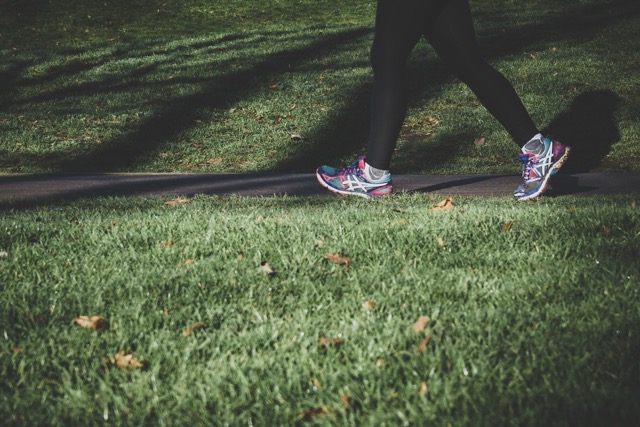Cover photo: Emma Simpson on Unsplash
We all walk every day. When we wake up and go to the bathroom to brush our teeth, then to the kitchen, climb the stairs, and finally work or study. Some of us even walk to buy our groceries instead of using the car. Apart from saving money, it’s a positive behaviour that offers many advantages. And that is the focus of this post: the benefits of walking to lose weight and stay healthy.
Today’s Focus of Attention is reader-supported. We sometimes include products we think are useful for our readers. If you buy through links on this page, we may earn a small commission.

Let’s Take a Stroll
Most people don’t see walking as an effective way to burn fat and regulate body weight. I used to think that going to the gym was the best strategy, since walking on the street or in the park was easy and not enough to eliminate too many calories. In my mind, being fit was related to lifting weights or running on a treadmill for hours, drenched in sweat, and barely breathing.
But the truth is that I’ve wiped quite a few kilos through walking over the last four weeks, to the point that I can now wear all my jeans and nobody is afraid of my trouser’s button popping and poking their eyes. Walking consistently throughout the week made a big difference; in my case, twice a day, between 20 and 30 minutes.
How Did I Start?

Walking is simple.
A couple of months ago, since my time was short, I allocated just a few minutes in the morning for this activity. Mostly because I was sick of being imprisoned at home the whole day. It was more like a form of therapy for me to clear my mind. I can’t deny that I felt exhausted in the first week, but after week two, I had more resistance and stamina, resulting in more time spent walking. My breathing improved, my brain functioned better as more ideas flowed, and my legs, of course, gained strength. After a month, without realising it, I had lost enough waistline to wear those jeans I hadn’t worn in around a year.
I was really impressed and said to myself, “I’m not on a diet. I’m just walking and eating a little less, but only a little. Am I sick?” Once I realised my daily walks caused all this, I started moving for extended periods, adding two minutes a day, and at a faster pace – say, 10% more. I expanded my routine with baby steps without too much effort. Obviously, had I gone to the gym, lifted weights, and ran, I would’ve lost more weight in a shorter time.
Walking vs Running
Intense physical activities such as running have some advantages over the lower-intensity ones. To illustrate, power training gives you the same results in 15 minutes as walking for one hour. Not only does it increase efficiency, but it also builds more muscle and uses oxygen more efficiently.
However, a high-intensity workout can exhaust your nervous system, leaving you tired and less motivated to continue. Another issue with running is that it could create more stress on your joints.
Every time your foot strikes the ground, you receive 2.5 times your body weight. Whereas with walking, this reaction is merely 1.2 times, as this activity has a lower impact. Hence, if you are not in shape or have suffered some kind of injury, walking sounds like the path to take.
An added benefit is that it’s an easier habit to keep; it can be done basically anywhere, doesn’t interfere with your time, and it’s effective.

Benefits of Walking for Weight Loss and Health
Bones and Joints
The Arthritis Foundation recommends at least 30 minutes of moderate walking every day. With that, you have more mobility, minimise the chance of fractures, and strengthen your bones, not to mention reduce osteoporosis and bone loss.
Back Pain
Like me, you can also be free from that. Walking makes the blood flow better within the spinal structures, thus all the nutrients reach the soft tissues in that area, vital for a healthy spine. On top of that, your spine stabilises, strengthening your muscles, keeping your body upright, and improving your posture.
Muscles
Apart from losing weight, you can also bulk up. Nevertheless, to achieve such a goal, you must add some uphill walking and increase the time and intensity a little.
Digestion
The more you move, the easier you will digest your food. With just half an hour a day, you improve your digestion and bowel movements, while lowering the risk of developing colon cancer.
Brain
Over 55 million people around the world suffer from Alzheimer and another 55 million from dementia. And statistics predict it will double in the next two decades. The good news is that by exercising regularly, you can break free from that figure, contrary to those who have a more sedentary lifestyle. Low-impact aerobic exercises prevent the early start of dementia and decrease the likelihood of developing Alzheimer. This is because the more active a person is, the more the hippocampus increases its volume – the part of the brain in charge of memory and learning. More importantly, walking reduces stress and releases endorphins. That’s why you’re happy after exercising.
Mind
As we know, body and mind are one. A daily 30-minute routine improves depression symptoms, as reported by The Journal of Psychiatric Research. They conducted a study on 50 individuals who were suffering from major depression and discovered how a physical routine helped them.
Eyes
Is there any relationship between your legs and your eyes? Apparently, yes. The best way to cut down the risk of developing glaucoma is through walking, since this physical activity relieves the pressure in the eyes. High tension affects the optic nerve, resulting in visual impairment. In a like manner, walking strengthens and stimulates the visual cortex, leading to better and healthier vision.
Lungs
Since walking is an aerobic exercise, it increases oxygen flow in the bloodstream, eliminating toxins and waste, but also increasing your breathing capacity. Walking moves many parts of your body: legs, arms, heart, and lungs, and the more you do it, the better performance these organs will have.
Pancreas
A 30-minute walk proved more efficient than running to prevent diabetes. Look. A study showed that a group of walkers improved their glucose tolerance and blood sugar absorption six times more than a group of runners. Your pancreas will thank you since the better the use of blood glucose is, the less insulin the pancreas produces.
Heart
Jogging, sprinting, or any other physical activity fortifies the heart. As stated by the American Heart Association, walking is as effective as running when it comes to preventing heart attacks and strokes. With thirty minutes, you avoid coronary diseases, lower high blood pressure, improve circulation, and reduce your cholesterol levels.
FIT Formula
Let’s not finish this article without mentioning something important: the FIT formula (frequency, intensity, and time).
Frequency refers to how often you walk every week. If you don’t want to start five times, do it twice, but stick to that. Be consistent. This is key. Once you are at ease, increase to three or four.
Intensity is about how hard you should walk. I began walking normally, neither hurried nor relaxed. You know, pretty normal. Do not speed walk because you can reach the danger zone. And that would be terrible, as you might experience exhaustion and have no mood to continue. If you can’t talk while walking, it means you’re going too fast. Ease up.
Time speaks for itself. I started with 5 minutes. After week one, I added two extra minutes to my walk. Now I do it for 20 to 30 minutes twice a day. But, as mentioned before, I did it gradually. I didn’t want to burn out. I prefer to walk alone, but a partner could make your experience more enjoyable.



1 thought on “How to Lose Weight by Just walking A Few Minutes A Day”